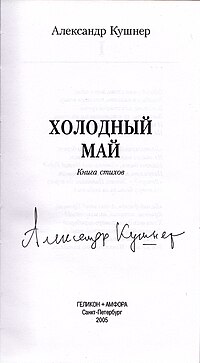Alexander Kushner

Alexander Semyonovich Kushner (Template:Lang-ru, born 14 September 1936, Leningrad) is a Russian poet from Saint Petersburg.
Biography
Kushner was born in Leningrad into a Russian-Jewish family; his father was a military engineer. He graduated from Herzen University, and later, between 1959 and 1969, taught Russian literature. After that he became a full-time writer and poet. Since then he published about 15 collections of his poetry and two books of his essays. In 1965 he became a member of the Writers' Union, in 1987 joined the Russian PEN Center. He is also editor-in-chief of Biblioteka poeta (the "Library of the Poet" series). His only son Eugene and his family live in Israel.
In October 1993, he signed the Letter of Forty-Two.[1]
His poetry resembles that of Acmeists. He usually doesn't write in free verse and seldom experiments or tries to elaborate a new poetic form, preferring to write in a classic, 19th century-like style. The Nobel Prize winner Brodsky once called Kushner "one of the best lyrical poets of the 20th century", adding that his name "is to stand in the line of names dear to the heart of every native Russian speaker" [2]
Translations of Kushner's poetry into English, Italian and Dutch were published in book form; several poems were also translated to German, French, Japanese, Hebrew, Czech and Bulgarian.
Bibliography
Books of verse

- The First Impression (Template:Lang-ru) 1962.
- The Night Watch (Template:Lang-ru) 1966.
- Omens (Template:Lang-ru) 1969.
- The Writing (Template:Lang-ru) 1974.
- The Direct Speech (Template:Lang-ru) 1975.
- The Voice (Template:Lang-ru) 1978.
- Tavrichesky Garden (Template:Lang-ru) 1984.
- Day Dreams (Template:Lang-ru) 1986.
- The Fence Hedge (Template:Lang-ru) 1988
- Night Music (Template:Lang-ru) 1991.
- On the Dark Star (Template:Lang-ru) 1994.
- The Milfoil (Template:Lang-ru) 1998.
- Bank of Clouds (Template:Lang-ru) 2000.
- Bushes (Template:Lang-ru) 2002.
- The Cold May (Template:Lang-ru) 2005.
- In the New Century (Template:Lang-ru) 2006.
- One Cannot Choose Times...(five decades) (Template:Lang-ru) 2007.
- Apollo in the Grass. 2015.
Works in prose
- Apollo under Snow (Template:Lang-ru)
- Wave and Stone (Template:Lang-ru)
- The Fifth Element (selected verse and articles) (Template:Lang-ru)
Awards
His numerous awards include the Russian National Award (1996) and the prestigious Pushkin Prize for poetry, bestowed on him by Russian president Vladimir Putin in 2001. [1]
Also
- «North Palmira» (1995).
- Award of Novy Mir magazine (1997).
- Tepfer fond Pushkin award (1998).
- Award of Tsarskoe selo (2004).
- "Poet" award (2005).
References
- ^ Писатели требуют от правительства решительных действий. Izvestia (in Russian). 5 October 1993. Retrieved 21 August 2011.
- ^ Brodsky's preface in Selected Verse of Kushner, St. Petersburg: Khudozhetvennaya literatura
External links
- Short biography
- Petersburg Perspectives: Alexander Kushner has been described by Joseph Brodsky as one of the best lyric poets of the 20th century
- Времена не выбирают in verse English translation
